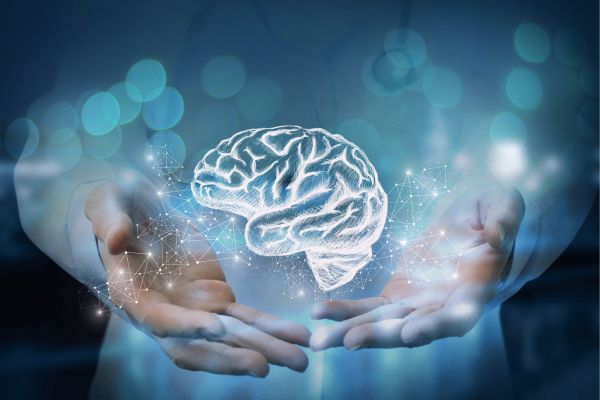
From the Desk of Carolyn Dean MD ND
We need to talk about your brain.
For many people – especially those over 50 – conversations about brain health feel uncomfortable, but nearly everyone today has some contact with someone who’s experiencing a neurodegenerative disease or disorder like Alzheimer’s, dementia, vascular dementia, Parkinson’s disease, or amyotrophic lateral sclerosis (ALS). These are the diseases behind the cognitive decline that so many people are terrified of experiencing.
Shocking headlines about these diseases amplify that fear, especially in older adults. But these warnings about our aging brains don’t offer sound solutions or steps to support your brain.
It’s time for some straight talk about the brain and what you can do to support your brain as you age.
What Dr. Google or an MD might say about cognitive decline:
Cognitive decline isn’t an illness but a symptom of an underlying neurological issue. Cognitive decline is unique to each individual having this experience, but symptoms may include the following:
Memory: frequently forgetting or misplacing things, or repeating stories
Behavior: reduced interest in activities, rising anxiety, depression, or aggression
Orientation: feeling lost in familiar places
Communication: trouble following conversations or finding the right words
Tasks: difficulty completing steps, following instructions, decision making
NOTE: If you’re mentally checking off a few of these symptoms in yourself, take a breath. Everyone forgets their keys or struggles to find a word now and then. That alone doesn’t mean cognitive decline. keep reading and know that I offer sound solutions to help you support your brain function.
Neurodegenerative diseases
When people recognize these symptoms, the alarm bells often go off. Conditions like Alzheimer’s and Parkinson’s involve the slow deterioration and death of neurons in the central or peripheral nervous system. This disrupts the neural networks responsible for memory, thinking, and movement.
In researching these diseases, I’ve learned that medical science continues to vaguely default to age, genetics, environmental influences and lifestyle factors.
They do make clear, however that these diseases cause permanent damage that worsens over time. This is why people fear such diagnoses – because there seems to be little hope offered to people. (Keep reading for the hope!)
Medical tests
I’m won’t go into the details here but the process of testing for neurodegenerative diseases is complex and intense and may include a spinal tap to analyze spinal fluid, MRIs, EEGs, and cognitive testing.
I’m not sharing this to frighten you – but to highlight something empowering: you don’t have to wait for symptoms to progress or even appear, or for complicated testing to give you a diagnosis. You can begin supporting your brain now. One of the simplest, most overlooked ways to do that is by replenishing magnesium in its picometer, stabilized ionic form.
Your medical practitioner will not make this recommendation because they have not been educated about the role of magnesium in protecting your brain’s neurons.
Dr. Google might … I mean, Will, suggest drugs
The standard approach is drugs – many drugs – a lifetime of drugs. Instead of magnesium, a wild array of medications is prescribed to manage symptoms. These drugs don’t provide any kind of cure for the diseases but claim to offer relief.
What I say about neurodegenerative diseases
In my book, The Magnesium Miracle, I boldly say, “dementia may be caused by magnesium depletion alone.” This statement is supported by multiple studies showing that extremely low magnesium levels can trigger serious neurological symptoms. Especially at risk are people who take diuretic medication for high blood pressure and as I’ve discussed in previous blogs, more and more people are being prescribed drugs for HBP at younger and younger ages. But according to the above reputable studies, neurological symptoms were reversed with high doses of intravenous magnesium.
According to surveys, nearly 80% of the population worry about developing dementia and 60% believe that their cognitive decline is inevitable. But what if appropriate amounts of magnesium in the picometer, stabilized ionic form is a solution that can calm the fears, and the symptoms of our aging population?
Aging changes how your body handles magnesium
As you age, your body’s ability to absorb magnesium naturally declines. As you get older, your need for an appropriate, absorbable magnesium increases. However, many older adults are taking drugs that further deplete the body’s magnesium. In fact, studies indicate that many senior citizens are taking 6-8 different medications at any one time. For anyone taking more than one medication, it’s important to know that there is no research examining the side effects, vitamin, mineral and nutritional deficiencies created by this common practice of overmedicating older adults.
How’s your memory?
Not great? Then, at least, remember to take your magnesium. With all the fear and hype around “cognitive decline” in our aging population, it’s shocking to me that medical professionals aren’t aware of magnesium and memory research done 20 years ago at MIT. The brain’s memory and learning receptors rely on magnesium in the cerebrospinal fluid to stay active, interactive and changeable! Without magnesium, the areas of the brain responsible for short-term memory become inactive resulting in forgetfulness and memory lapses.
A simple magnesium deficiency may be at the root of your, or your loved one’s seeming cognitive decline. You can safely test this theory yourself with an appropriate amount of magnesium in the picometer, stabilized ionic form. And the only side effect would be a magnesium boost to 80% of your body’s metabolic functions that rely on magnesium!
Neuroinflammation linked to Alzheimer’s and Parkinson’s disease
Inflammation in the brain is caused by deposits of calcium, aluminum and other heavy metals in brain cells. And too much calcium without magnesium’s protective intervention causes cell death in the brain, something that researchers are investigating as a possible cause of dementia, Alzheimer’s, and Parkinson’s disease.
Magnesium is a powerful anti-inflammatory and when its deficiency is corrected it’s able to target inflammatory responses throughout the body including the brain.
86 Billion Neurons Need Magnesium
Before I forget! Let me tell you about the tremendous amount of magnesium that’s needed by our neurons. It’s because each neuron houses Two Million Mitochondria! The heart only has 5,000 per cell. Now for the game-changer. Mitochondria make ATP energy and ATP-Mg is the actual formula. So, our amazing brains are living on a diet of hi octane magnesium and we have to make sure we supply them with picometer magnesium! Two million mitochondria in each neuron is the reason I say that brain health is dependent on magnesium.
What you can do to support your cognitive function
When I say take the Right magnesium, I mean in the picometer, stabilized ionic form. And the dose should be around 600mg per day. This liquid magnesium is diluted in a liter of sea-salted water and sipped throughout the day. Magnesium is necessary for the proper function of 80% of known metabolic functions.
What I don’t mean is magnesium L-threonate, touted as the ‘only magnesium that crosses the blood-brain barrier.’ This is disinformation of the highest order and has been debunked repeatedly.
Vitamin D is a prohormone that regulates the production of hormones and aids in the absorption of calcium to protect our bones. Most vitamin D blood tests show that we may need about 5,000iu a day along with a dose of vitamin K2. Remember, magnesium is necessary for the activation of vitamin D.
Vitamin B Complex – a methylated and food-based B complex formula along with two sulfur-based amino acids provides several vitamins that are necessary for adrenal support and detoxification as well as all the critical methylation functions of the body.
Multiple Minerals – picometer, stabilized mineral ions support thyroid hormone production as well as adrenal and sex hormone balance.
The above formulas make up my daily protocol, and I feel better now in my mid 70s than I did in my 30s! And if you’re wondering how my brain is functioning, I wrote 5 books already this year!
You don’t have to accept cognitive decline as inevitable passively.
Supporting your brain with magnesium and key nutrients is one of the most proactive, empowering steps you can take for your future self.
The best way to proceed is to call our excellent Customer Experience Team to help build a healthy protocol that you can depend on.
Carolyn Dean MD ND
The Doctor of the Future



